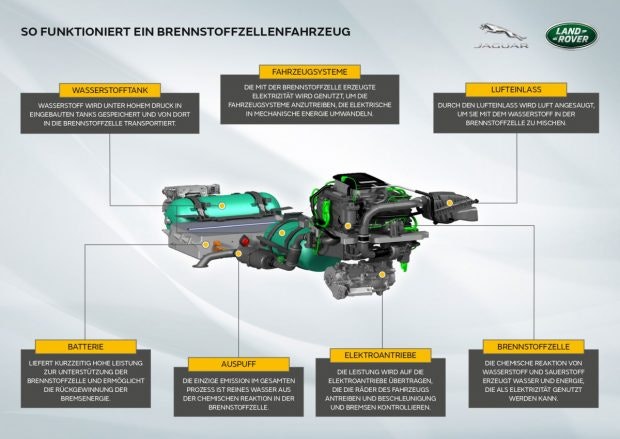Hydrogen-powered Defender prototype planned for this year
The hybrid model of the Defender could be followed by a hydrogen counterpart. (Photo: Jaguar Land Rover)
After the hybrid version from last year, the off-road vehicle manufacturer Land Rover now wants to intensify its hydrogen ambitions. A British funding program supports the ambitious plans.
Jaguar Land Rover (JLR) developed a new drive system for the prototype. Test operations are scheduled to start at the end of this year. The company, which has been part of the Indian Tata Group since 2008, aims to reduce the exhaust emissions of its models to zero by 2036. Last year, the British manufacturer began exploring hydrogen alternatives in its “Zeus project”. Mentioned that state aid is flanking the project JRL in its latest press release However not.

The luxury car manufacturer Jaguar Land Rover presents its first fuel cell drive. (Graphic: Jaguar Land Rover)
Contents
Fuel cells for SUVs
Already last summer there were reports that the premium manufacturer was working on a hydrogen variant of an SUV. The Journalists found information in an internal authority document. The project is still in the initial phase and will be developed together with “world-class partners” from industry and research. They are all from the UK and according to the document, the government hopes to give the domestic economy a competitive edge in the design and production of hydrogen electric vehicles. Media reports of around 85 million euros in subsidies for the project. That fits in with Jaguar Land Rover’s plans. In February the company announced that fuel cell drives with “green” hydrogen were part of the Reimagine strategy. This is what the Tata subsidiary calls its electrification program.
Project Zeus and the advantages of hydrogen
Car media recently found out more and more about the “Zeus Project”. The first large series of vehicles with fuel cell drives are expected to start in 2030. Range Rover, Range Rover Velar and Range Rover Sport are mentioned. Land Rover could also add hydrogen models to the next generation of the Pace series. The head of product development recently said: “Hydrogen is ideal for larger vehicles in our fleet, because the bigger the car, the lower the yields when using battery packs.”
In the current announcement, the off-road vehicle manufacturer specifies the advantages: The drive technology has a high energy density and can be refueled quickly. In addition, the range is only minimally reduced at low temperatures. The fuel cell drive is suitable for large vehicles with long ranges and for use in particularly cold and warm environments. This fits the profile of Land Rover all-terrain vehicles, which also have to function in extreme climatic conditions and are designed for long journeys. JLR writes that the off-road properties and fuel consumption are the focus of testing.



